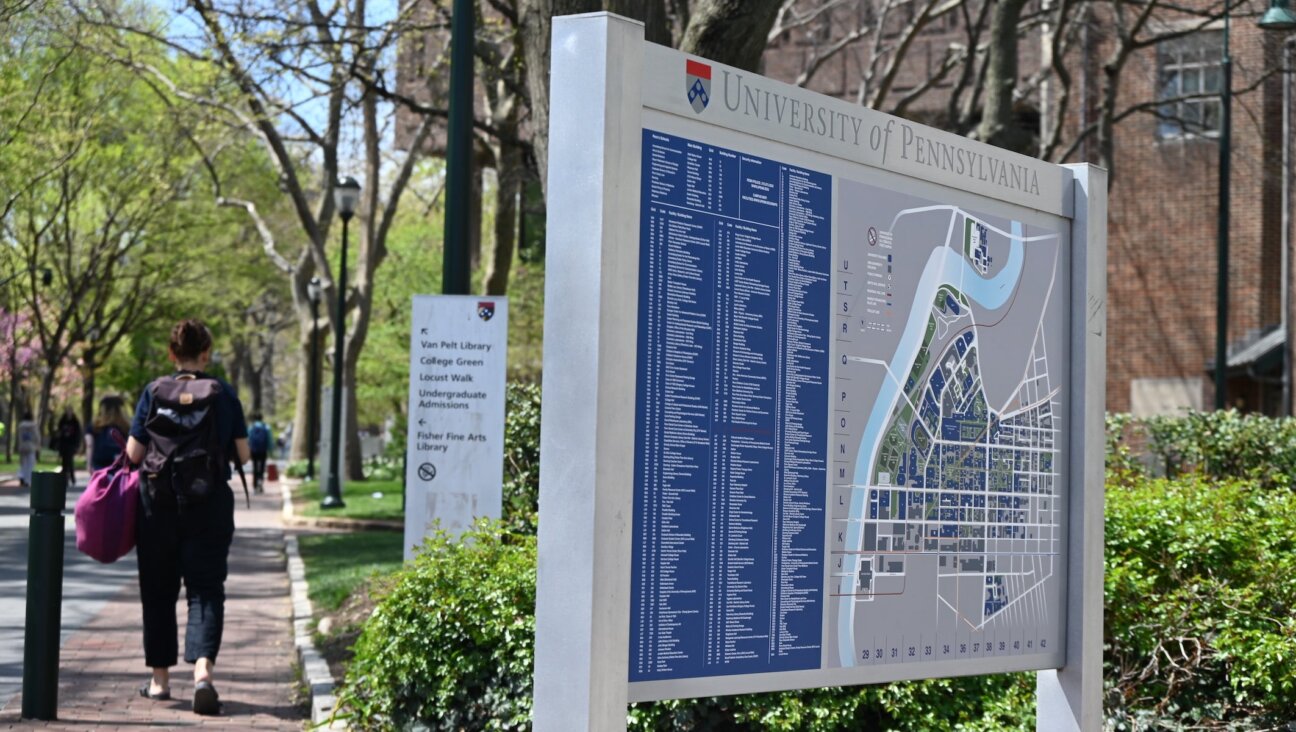German Communal Leader Probed After Drug Bust
BERLIN — Germany’s most prominent Jewish leader is under investigation after police found cocaine in his apartment and office last week. Reports on the scandal have since associated Michel Friedman — vice president of the Central Council of Jews in Germany, as well as a television talk show host — with prostitution and a crime ring, in addition to drug use.
In a bizarre coincidence, the drug bust came just six days after the death of Friedman’s staunchest foe, German politician Jürgen Möllemann. In what was an apparently unrelated incident, Möllemann fell to his death while parachuting, and is widely believed to have committed suicide.
Friedman’s life had, to this point, been a success story; the son of parents saved by Oskar Schindler, he grew up to become an important political figure and an outspoken Jewish personality in Germany. But the current investigation threatens to bring his tale to an ugly denouement.
Police raided Friedman’s home and offices in Frankfurt last Wednesday and found three packets of cocaine, none of them large enough to warrant Friedman’s arrest, but together enough to initiate an investigation. On Friday, Björn Retzlaff, a spokesman for the Berlin Justice Department, confirmed reports that police had obtained a warrant after Friedman’s name arose during the investigation of a criminal ring that was smuggling prostitutes from Ukraine.
Retzlaff stressed that Friedman is not under suspicion for involvement in the smuggling. But in an article on Monday, the newsmagazine Der Spiegel reported that investigators have evidence of Friedman ordering prostitutes under the name Paulo Pinkel. Der Spiegel also said that two Ukrainian prostitutes independently told investigators that Friedman had asked them to use cocaine with him.
As head of the Central Council, Friedman, 47, holds a prominent communal position. Religious life in Germany is much more centralized and hierarchical than in the United States and, consequently, the council members, and Friedman in particular, have a level of influence held by no corresponding figure in the United States.
Friedman has thus far declined to comment on the scandal. This reticence is uncommon behavior for a man who is famous for the confrontational style he employs on his popular television talk show “Vorsicht Friedman!” — “Look Out, Friedman!” — which has been canceled for the rest of the season.
In an interview with the Forward last year, Friedman said, “I love to bother politicians during the interviews; they just hate it and it creates some animosity, no doubt.” His rambunctious style has generated no shortage of enemies. In recent years his security detail has been as large as that of the German chancellor.
It was his forthrightness that provoked the ire of Möllemann, a leader, until recently, of the neo-liberal Free Democratic Party. In the days leading up to last September’s parliamentary elections, Möllemann distributed eight million pamphlets that accused Friedman, a member of the conservative Christian Democratic Union, of provoking antisemitism in Germany with his “intolerant and spiteful style.”
Möllemann’s words were decried from all sides of the political spectrum, and the political damage, along with subsequent charges of tax evasion and illegal fundraising levied against him, led Möllemann to step down from his leadership post in March.
The day before Möllemann jumped to his death on June 5, the German high court stripped him of his parliamentary immunity, and his apartment and offices were searched. German newspapers have frequently talked about the deaths in the same articles, but none have made any link between the cases.
Ironically, some in the Berlin Jewish community are bristling at possible hints of antisemitism in the media circus surrounding the investigation of Friedman, one of the most visible and outspoken opponents of racism and antisemitism in Germany.
“He’s a celebrity, so it makes sense that people are so interested,” said Walter Rothschild, a liberal rabbi in Berlin, who believes there is something suspect about how frequently the media has mentioned Friedman’s position in the Jewish community. “But he has many jobs, and we keep hearing that he is the vice president of the Central Council. Why is that the only thing to keep stressing?”
Others, though, see no hint of antisemitism in the coverage. “The quality of coverage has been very fair, even perhaps a little reluctant in commenting on it,” said Jürgen Falter, a political scientist at the University of Mainz and an acquaintance of Friedman. “People are extremely careful.”
Salomon Korn, the leader of Frankfurt’s Jewish communal organization, agreed with this assessment of the press. “There are no open antisemitic impulses. Whatever exists has remained hidden,” Korn said.
As for Friedman’s future with the Central Council, the jury still appears to be out. Paul Spiegel, president of the Central Council, has said that the drug investigation is a personal affair and should not affect Friedman’s work with the Council. But Friedman’s lawyer sounded a somewhat different note when asked if Friedman will continue his work with the Council. “He has other things to deal with right now,” said his lawyer. “For the time being, he will have trouble fulfilling his responsibilities if he is unwilling to appear in public.”
The bigger concern for most observers is the impact this scandal will have on the image of Jews in Germany. Stephan Kramer, executive director of the Central Council, said the organization has already received numerous antisemitic letters, e-mails and calls connected to the case.
“There will definitely be a spillover to the collective level, which is a familiar pattern,” according to Michael Wolffsohn, a professor of German-Jewish history at the German Federal Armed Forces University. “This tendency must be combated.”
According to Korn, this is a deciding moment: “This will be the proof of how far German-Jewish normality has come.”
















